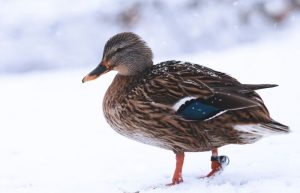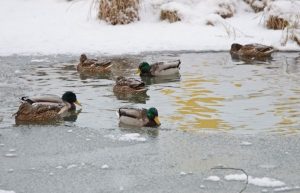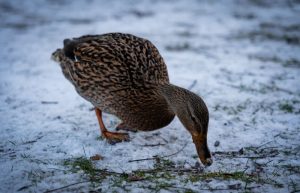
Can Ducks Live In the Cold?
With the freezing weather, you may be wondering how your feathery duck friends are faring in the below-freezing temperatures outdoors. You may see ducks swimming on ponds or walking in snow and may wonder if they get cold or are affected by frostbite. In this care guide, you’ll learn all you need to know about ducks and the cold and how to best care for your ducks in the winter months.
Do ducks get cold? Due to anatomical aspects like multiple layers of feathers, a high core body temperature, and a counter-current blood system, ducks are considered very tolerant to cold temperatures. While ducks are known as cold-tolerant birds, being in a cold and wet environment for a long period of time can lead to negative health conditions like hypothermia and even death.
Ducks are relatively low-maintenance poultry, but there are a few simple things you can do to ensure that your ducks thrive during the winter months. To learn more about caring for your ducks in the cold, keep reading:
Ducks Have Natural Protection From the Cold
While it may not look like it at first glance, ducks are well-equipped to handle sub-freezing temperatures due to certain anatomical aspects. Everything from the layering of their feathers to the way their blood flows through their body enables them to thrive in cold temperatures and winter conditions. Here are some ways ducks are able to stay warm even when it’s cold outside:
Ducks Have Multi-Layered Feathers
You may not be able to tell from just looking at them, but ducks have multiple layers of feathers that work to keep them warm. The top layer of feathers is thick with waterproof qualities that seal out moisture. The bottom layers of feathers a soft down feathers that work to insulate the duck’s body heat. If you’ve ever worn a down jacket, then you know how effective these feathers can be at keeping the cold out. Not only will the layers of feathers help guard the duck against the cold, but they will also help the duck to insulate its body temperature and keep heat from escaping.
Ducks Have a High Core Body Temperature
Like most poultry, ducks have a high body temperature of 106-108°Farenheit (41° – 42° Celcius). A high body temperature enables ducks to stay warm even when the temperatures are below freezing. Most poultry have a higher core temperature that enables them to survive during the colder months.
Ducks and chickens are very similar when it comes to caring for them in the cold. To learn more, check out my article Do Chickens Get Cold? Essential Guide.
Ducks Have a Counter-Current Blood System
Ducks have this very scientific-sounding thing called a counter-current blood system. This enables them to regulate their body temperature and also keep their extremities from freezing or getting frostbite. In simple terms, this blood system trades cold blood from the duck’s legs and limbs with warm blood from the duck’s body.
This means that the cold blood isn’t able to come back into the body and cause the core body temperature to drop. It also means that there is warm blood flowing through the duck’s legs so that they don’t freeze. Since a duck’s legs aren’t covered with feathers to keep them warm, this is how ducks escape the effects of cold temperatures of otherwise susceptible areas of their bodies.
How to Care For Your Ducks in Cold Weather
 While ducks can naturally do well in cold temperatures, it doesn’t mean that you should ignore them and expect them to be just fine without care. There are steps you can take to ensure your ducks are comfortable and warm and that all their needs are being met, even if it is cold outside. Here are some steps you can take to care of your ducks during the winter:
While ducks can naturally do well in cold temperatures, it doesn’t mean that you should ignore them and expect them to be just fine without care. There are steps you can take to ensure your ducks are comfortable and warm and that all their needs are being met, even if it is cold outside. Here are some steps you can take to care of your ducks during the winter:
Give Your Ducks Extra Feed in the Winter
Ducks are foragers by nature. In the warmer months when food is plentiful, they’ll eat insects, worms, weeds, water vegetation, and small fish. They can easily be sustained by the snacks they may find as they browse around.
During the colder months, food becomes more scarce as vegetation and insects die off. You’ll need to supplement your flock’s diet with duck feed that is high in calories. This will help to sustain your ducks’ weight and energy production, as they will need more energy to keep themselves warm when it’s cold. You can also sustain their diets with extra snacks like corn, oatmeal, and greens. You can even give them leftovers from your table like kale, cabbage, and other green vegetables.
Add Extra Bedding to the Duck’s Nesting Area
Adding extra bedding to your duck coop or shelter can help insulate the area while also providing your ducks with extra comfort and warmth as they nest. I often find that straw is the best bedding to use for extra insulation since the ducks can burrow down into it. If you do plan on using straw bedding, just be sure to regularly remove old bedding, as straw can get moldy much easier than other bedding material.
You can also lay bedding or wooden panels around the outside of your coop so the ducks can go outside without walking in the snow or the mud. While most ducks don’t mind going in the snow, some will refuse to leave their coop unless there is something else to walk on. Ducks will tuck their feet under their bodies to help warm their legs if they are feeling cold. Giving them the option to be outside but off the snow can further protect their exposed legs from cold temperatures.
Make Sure Your Ducks Have Adequate Shelter
During the winter, predators may turn more frequently to farm animals and poultry for their meals. A safe and secure shelter is vital to the survival of your ducks both in the cold and warm months. A good shelter with a secure run will keep predators out.
In the colder months, an adequate shelter will provide your ducks with a way to escape the cold and the stress brought on by freezing temperatures and winter conditions. During the winter, ducks will spend more time inside resting and huddling together for warmth, so it’s important to provide a comfortable and cozy place for them.
While ducks may be able to withstand the cold, adding moisture and precipitation to the mix can be a dangerous combination. It’s in cold and wet environments where poultry can start to be affected by hypothermia. You’ll want to make sure your shelter provides escape from the elements and offers a dry place for your ducks to rest.
Do ducks need a coop? That’s a great question! To learn more, check out my article Do Ducks Need a Coop: What You Need to Know.
Make Sure Your Duck Coop is Well-Ventilated
Ducks emit moisture when they breathe, much more than chickens and other poultry. They can emit enough moisture that a poorly-ventilated coop may be affected by condensation and mold. Because of this, you’ll want to make sure your duck house is well-ventilated. Vents should be plentiful and positioned up high, not at floor level. You can also put mesh wiring over windows so that air can move freely through the coop without letting predators in.
Don’t be tempted to heat the duck house. Heat lamps are a fire hazard and the heat can actually create additional moisture, which can lead to frostbite and even hypothermia.
Give Your Ducks the Option to Go Outside
 Just because it’s cold outside doesn’t mean that your ducks won’t want to stretch their legs and get some fresh air. During the day, you should give your ducks the option to go outside, even if they decide to stay in the coop where it’s warm. Being able to move about can help keep your ducks both mentally and physically strong.
Just because it’s cold outside doesn’t mean that your ducks won’t want to stretch their legs and get some fresh air. During the day, you should give your ducks the option to go outside, even if they decide to stay in the coop where it’s warm. Being able to move about can help keep your ducks both mentally and physically strong.
You can even fortify your duck pen to make it more enjoyable for your ducks to be outside. You can put a windbreak up in the corners using tarps or plywood. Even when it’s cold, your ducks may still like to go out and bathe in the sun or dunk their heads underwater.
Provide Fresh Drinking Water to Your Ducks
In the winter, the risk of dehydration in poultry can increase due to waterers freezing over and ducks not having access to fresh drinking water. Birds need water in order to properly digest their food, so dehydration can lead to a long list of other problems.
The best thing you can do in the winter months is to invest in a heated waterer for your ducks. These waterers will keep water from freezing, giving your ducks access to fresh drinking water whenever they need it. You can put one in their enclosure and one in their coop so they have water wherever they go.
Keep the Duck Pond or Pool From Freezing
Having access to a water source where they can swim and clean themselves is vital to a duck’s existence, even when it’s cold outside. While ducks are less likely to swim in the winter, they may still use a water pond to clean their feathers and dunk their heads. That being said, one aspect of caring for your ducks in the winter is figuring out how to keep your duck pond from freezing, whether it’s a small kitty pool or a larger duck pond for a whole flock of ducks.
There are several ways to prevent a duck pool or pond from freezing; here are the ones I’ve found the most effective:
Salt Water Bottles
To use this method, fill water bottles or milk jugs half full with a saltwater solution. Saltwater freezes at a lower temperature than freshwater, which will enable the bottle to float around and circulate the water in the pond so it doesn’t freeze.
Not only have I used this method for duck ponds but also to keep water troughs from freezing for other livestock animals. This method usually works until the temperatures drop into the low teens. This is an inexpensive do-it-yourself option to keep your duck pond from freezing.
Floating Energy-Powered Water Movers
A floating energy-powered water mover is a device that sits on top of the water in the duck pond and causes the water to move and circulate. Moving water won’t freeze unless the environment is extreme. Still water will freeze much more easily and at higher temperatures than moving water. Investing in a water mover may be your best bet for keeping your duck pond free of ice.
Conclusion
While it’s important to be aware of the needs of your ducks and to take the proper steps ahead of time to prepare for winter, caring for ducks in the colder months can be relatively easy if you have planned ahead. Regularly checking on your ducks throughout the winter and especially on days with extreme weather can help you stay on top of your flock’s health and living conditions.
Just like any animal, caring for ducks, whether in the winter months or in the summer months, requires a time commitment to see to your animal’s well-being and needs. Planning a schedule ahead of time can help you be more efficient and effective as you care for your animals.
Want to read more articles about poultry care? Check out the ones below!
